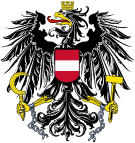Austrian political party
This article is about the former political party in Austria. For the former political party in Germany, see German Democratic Party.
| This article is part of a series on the |
| Politics of Austria |
|---|
 |
Wöginger • Babler • Kickl • Maurer • Meinl-Reisinger •
|
|
The German Democrats (German : Deutschdemokraten) was a political party in Austria.

